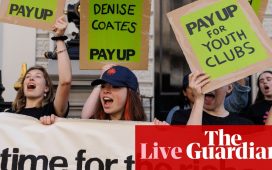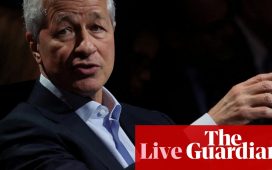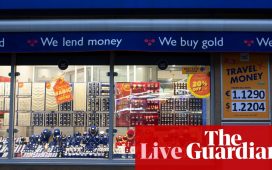Siemens Energy shares plunge as it seeks government support
Germany’s Siemens Energy are reportedly in talks with the Berlin government to secure billions of euros in state guarantees as it struggles to shore up its troubled wind-turbine unit.
Shares in Siemens Energy have dropped by almost 29%, after news website Der Spiegel reported that the company’s CEO, Christian Bruch, is negotiating with the federal government for several billion euros in guarantees.
This funding would allow Siemens Energy – one of the largest makers of wind turbines -to continue financing new business despite the high losses in the wind turbine business.
According to @DerSpiegel, Siemens Energy, one of the world’s largest manufacturers of wind turbines, is in talks with the German government for state guarantees worth billions of dollars (otherwise known as a bail-out) https://t.co/tAm449j2Ww
— Javier Blas (@JavierBlas) October 26, 2023
Siemens Energy has confirmed this morning that it is evaluating various measures to strengthen its balance sheet, and is in “preliminary talks with different stakeholders”, including banking partners and the German government over fore more guarantees which are “necessary to facilitate the anticipated strong growth”.
It also warns that order intake and revenue at its wind business, Siemens Gamesa, are expected to be lower than market expectations for fiscal year 2024, and net losses and cash outflow are expected to be higher than market forecasts.
The company says:
In light of recent media reports regarding talks with the German government, Siemens Energy AG states the following: Siemens Energy financial results for fiscal year 2023 are expected to be fully in line with guidance. The former Gas and Power businesses are expected to continue their excellent performance in fiscal year 2024 and are on track to achieve their mid-term targets (fiscal year 2025). The wind business Siemens Gamesa is working through the quality issues and is addressing the offshore ramp up challenges as announced in the third quarter communication for fiscal year 2023. As Siemens Gamesa is for the time being not concluding new contracts for certain onshore platforms and is applying strict selectivity in the offshore business, order intake and revenue are expected to be lower than market expectations for fiscal year 2024, and net losses and cash outflow are expected to be higher than market forecasts.
The strong growth in order intake, particularly in the former Gas and Power business areas, leads to a rising need of guarantees for long-term projects. Considering this requirement, the Executive Board is evaluating various measures to strengthen the balance sheet of Siemens Energy and is in preliminary talks with different stakeholders, including banking partners and the German government, to ensure access to an increasing volume of guarantees necessary to facilitate the anticipated strong growth.
Key events
Back in the financial markets, Israel’s currency has hit its lowest in over a decade against the US dollar.
The shekel has fallen 0.25% today to 4.07 to the dollar, the weakest since 2012, as traders continue to anticipate a ground invasion in Gaza.
On 6 October, the day before Hamas’s surprise attack on Israel, the shekel had traded at 3.83 to the dollar.

Today’s losses come after Israel said its tanks had taken part in a “targeted raid” overnight in northern Gaza.
WirtschaftsWoche: Siemens Energy seeking €15bn of guarantees
Business news weekly WirtschaftsWoche reports that Siemens Energy is seeking up to €15bn of guarantees.
WirtschaftsWoche says the company is proposing that the federal government should guarantee 80% of the first tranche of €10bn, with its banks liable for 20%.
Under the peoposal, a second tranche of €5bn would be guaranteed by Siemens AG, which spun off Siemens Energy on the stock exchange three years ago and still holds 25% of its shares.
However, Siemens AG is currently showing little inclination to accept responsibility, WirtschaftsWoche says, citing information from“financial and government circles”.
A spokesperson for the German economy ministry has confirmed it is in talks with Siemens Energy, describing the discussions as “close and trustworthy”, according to Reuters.
Siemens Energy shares plunge as it seeks government support
Germany’s Siemens Energy are reportedly in talks with the Berlin government to secure billions of euros in state guarantees as it struggles to shore up its troubled wind-turbine unit.
Shares in Siemens Energy have dropped by almost 29%, after news website Der Spiegel reported that the company’s CEO, Christian Bruch, is negotiating with the federal government for several billion euros in guarantees.
This funding would allow Siemens Energy – one of the largest makers of wind turbines -to continue financing new business despite the high losses in the wind turbine business.
According to @DerSpiegel, Siemens Energy, one of the world’s largest manufacturers of wind turbines, is in talks with the German government for state guarantees worth billions of dollars (otherwise known as a bail-out) https://t.co/tAm449j2Ww
— Javier Blas (@JavierBlas) October 26, 2023
Siemens Energy has confirmed this morning that it is evaluating various measures to strengthen its balance sheet, and is in “preliminary talks with different stakeholders”, including banking partners and the German government over fore more guarantees which are “necessary to facilitate the anticipated strong growth”.
It also warns that order intake and revenue at its wind business, Siemens Gamesa, are expected to be lower than market expectations for fiscal year 2024, and net losses and cash outflow are expected to be higher than market forecasts.
The company says:
In light of recent media reports regarding talks with the German government, Siemens Energy AG states the following: Siemens Energy financial results for fiscal year 2023 are expected to be fully in line with guidance. The former Gas and Power businesses are expected to continue their excellent performance in fiscal year 2024 and are on track to achieve their mid-term targets (fiscal year 2025). The wind business Siemens Gamesa is working through the quality issues and is addressing the offshore ramp up challenges as announced in the third quarter communication for fiscal year 2023. As Siemens Gamesa is for the time being not concluding new contracts for certain onshore platforms and is applying strict selectivity in the offshore business, order intake and revenue are expected to be lower than market expectations for fiscal year 2024, and net losses and cash outflow are expected to be higher than market forecasts.
The strong growth in order intake, particularly in the former Gas and Power business areas, leads to a rising need of guarantees for long-term projects. Considering this requirement, the Executive Board is evaluating various measures to strengthen the balance sheet of Siemens Energy and is in preliminary talks with different stakeholders, including banking partners and the German government, to ensure access to an increasing volume of guarantees necessary to facilitate the anticipated strong growth.
Unemployment in Spain has risen, giving the European Central Bank’s policymakers something to ponder as they set interest rates today.
The Spanish jobless rate rose to 11.84% in the third quarter of the year, statistics body INE reports, up from 11.6% in Q2.
Wouter Thierie, economist at ING, suggests the uptick might be caused by seasonal factors.
Thierie says:
The labour market benefited from strong growth in the more labour-intensive service sector, which was underpinned by a strong tourist season. In addition, the labour market is also suffering from a structural supply shock.
For instance, the average number of hours worked per worker is still lower than before the pandemic, which means more labour is needed to cover the same amount of hours. This exerts downward pressure on the unemployment rate.
INE also reports that the number of employed people in Spain increased by 209,100 in the third quarter of 2023, a rise of almost 1%, to 21,265,900, suggesting demand for labour remained robust.
European stock markets are in the red as traders await today’s ECB interest rate decision at lunchtime.
The pan-European Stoxx 600 inded has lost around 1%, with Germany’s DAX down 1.3%.
Shares in Mercedes Benz Group are down over 5% after it reported a 6.8% drop in operating profits, and warned that the electric vehicle market was “brutal” due to a flurry of price cuts.
In London the FTSE 100 is down 62 points, or 0.85%, pulled down by Standard Chartered (now -12.9%), while Unilever are still down almost 3%.
A takeover battle over the owner of Wagamama is brewing.
The Restaurant Group has told the City that the owner of Pizza Express, Wheel Topco, have asked to see financial information so they can decide whether to make a takeover offer for the company.
It told shareholders:
The Board of TRG confirms that it will provide diligence information to Wheel Topco in accordance with its obligations under the Code.
If any proposal is provided by Wheel Topco, the Board of TRG will carefully consider its terms, in conjunction with its advisers.
Restaurant Group has already accepted a £506m takeover offer from the US buyout group Apollo, which values it at 65p per share.
Shares in TRG have risen 1.8% to 67.6p, as traders anticipate a possible bidding battle.
Back in the City, shares in Standard Chartered bank have tumbled over 11% after it missed profit expectations and took a hit on its exposure to China.
Standard Chartered, the Asia Pacific-focused bank, reported that pretax profits more than halved in the last quarter to $633m, down from $1.391bn in Q3 2022.
The drop in profits was mainly caused by a $697m cut to the carrying value of Standard Chartered’s investment in China Bohai Bank.
Its credit impairment charges also rose, including $186m related to the China commercial real estate sector.
CEO Bill Winters says:
“We have continued to make strong progress in the third quarter against the five strategic actions outlined last year, delivering a solid set of results.
Wealth Management has continued its recovery with double digit income growth and the Financial Markets performance has been resilient against a strong comparator period.
European Central Bank chief Christine Lagarde was in upbeat mood last night, ahead of today’s interest rate decision.
Lagarde told a dinner in Athens that Greece has made an impressive comeback from the Covid-19 pandemic.
She said:
Real GDP per capita is now almost 10% above its pre-pandemic level – a much stronger performance than the euro area as a whole. The unemployment rate has also declined steeply, and was 10.9% in August, the lowest level since the end of 2009.
And with a stronger economy, the country has been able to work further through its debt challenge. Greece’s public debt-to-GDP ratio has dropped 35 percentage points from its peak of 206% in 2020, one of the fastest falls in the world.
Two rating agencies recently upgraded Greek government bonds to investment grade status.
The ECB’s Governing Council is in Athens as part of its policy of regularly holding meetings around the eurozone, rather than at its headquarters in Frankfurt.
🇬🇷🇪🇺 Our Governing Council is in Athens for their annual external meeting.
They’ll be discussing how to bring inflation back to our 2% target in a timely manner. pic.twitter.com/GsyK0nYFuA
— European Central Bank (@ecb) October 25, 2023
And here’s Victoria Scholar, head of investment at interactive investor, on Unilever:
“Unilever reported underlying sales growth of 5.2%, missing analysts’ expectations. While prices grew by 5.8% actual volumes of goods sold fell by 0.6%. However price growth slowed from 9.4% in the first half of 2023. Its personal care division outperformed with growth up 8% but ice cream lagged, falling by 2.8%. Unilever has named Fernando Fernandez as its new CFO today who will take over from Graeme Pitkethly.
New CEO Hein Schumacher who took to the helm in July said “our performance in recent years has not matched our potential. The quality of our growth, productivity and returns have all under-delivered.” He said the company plans to focus on 30 key brands accounting for 70% of its sales and does not plan to carry out any major acquisitions.
Unilever hopes that Schumacher’s appointment will help the company turn over a new leaf after recent criticisms of ‘profiteering’ from the inflationary environment and the failed £50bn bid for GSK’s consumer healthcare division under former CEO Alan Jope prompting Unilever’s activist investors to fight for a C-suite shake-up.
Shares in Unilever have fallen sharply today echoing a similar performance from rival Reckitt which saw its shares slump yesterday. Unilever is down over 10% in the past six months reflecting the weak consumer backdrop as shoppers trade down to unlabelled, cheaper substitute products.”
Here’s Charlie Huggins, manager of the Quality Shares Portfolio at Wealth Club, on Unilever’s results:
“This is another drab quarter from Unilever with underlying sales growth being entirely led by higher prices and volume declines accelerating in the quarter. Europe was particularly weak with volumes falling by over 10%, and the percentage of Unilever’s business winning market share on a rolling 12 month-basis fell to a disappointing 38%.
Unilever’s new CEO, Hein Schumacher, recognises that the group could and should be doing better. His ‘Action Plan’, announced today, is designed to reinvigorate performance through more impactful innovation, productivity savings and an improved culture.
Schumacher’s mantra is “fewer things, done better, with greater impact”. This means prioritising the top 30 Power Brands, instilling greater accountability and simplifying the business. For too long, Unilever has been too slow-moving, too complex and too weighed down by too many mediocre brands. A strategy to simplify and refocus on core strengths, perhaps augmented by some non-core brand disposals, feels like the right way to go.
Shares in Unilever have dropped 2.7% at the start of trading in London.
Matt Britzman, equity analyst at Hargreaves Lansdown, says the 0.6% drop in sales volumes was a little larger than expected.
Britzman says:
It looks like consumers are struggling to justify forking out extra for a tub of Ben & Jerry’s as Ice Cream sales continue to struggle. The group’s strengths in emerging markets continue to shine through, despite a slower recovery than expected in China.
It’s closer to home, in Europe, where price hikes are still in double-digit territory and Personal Care’s the only business unit showing volume growth. It’s hardly the end of the world, results were broadly in line with expectations and full-year guidance remains intact.
Unilever’s newish chief executive, Hein Schumacher, is outlining his action plan to drive growth at the company.
Schumacher, who took over this summer, says:
Unilever is a company of many strengths, including, its category positions, the strength of its brands, its unmatched geographic reach and talented and passionate people.
However, there has been a disconnect between these intrinsic strengths and the quality of our performance. Remedying this underperformance is our top priority and with Unilever’s strong fundamentals and the many opportunities across the five Business Groups, we are confident that we can achieve that.
The plan includes focusing on Unilever’s “30 Power Brands”. which make up 70% of its sales today, and building back its gross profit margins – which were hit by rising costs – through higher productivity.
Unilever has also signed a deal to sell Dollar Shave Club, the men’s grooming brand it acquired for $1bn in 2016 as part of a push into direct sales to consumers.
Unilever is dumping its Dollar Shave Club business to US private equity. Consumer group bought it for $1bn in 2016 in a big and ultimately disastrous bet on direct selling. Big flop.
Q3 sales growth continues to be driven by 5.8% price increases as volumes slow
— Ashley Armstrong (@AArmstrong_says) October 26, 2023
Ice cream sales hit by bad weather
Can it ever be too cold and wet for an ice cream? Apparently it can.
Unilever’s sales volumes of ice cream – such as Magnum and Ben & Jerry’s – fell by 10.1% in the last quarter.
Unilever blames “consumer downtrading and unfavourable weather, particularly in Europe.”
It raised its ice cream prices by 8.2%, meaning underlying sales fell by 2.8% (ie, it sold less, but at higher prices).
Price rises lift Unilever sales
Price rises continue to boost sales at Unilever, the conglomerate behind Dove soap, Marmite and Magnum ice-cream.
Unilever has reported underlying sales growth of 5.2% for the third quarter of the year, after it hiked its prices again.
Average prices rose by 5.8% year-on-year in the quarter, while sales volumes fell by 0.6% – suggeting some customers shifted to cheaper brands instead.
That’s a slowdown in price rises – in the first half of 2023, Unilever lifted its prices by 9.4%.
Unilever, which has been passing on its higher costs to consumers, reports that price continued to moderate as inflation eased.
Underlying sales volumes were positive in Unilever’s Beauty & Wellbeing, Personal Care and Home Care while sales volumes fell again in Nutrition and Ice Cream.
Unilever still expects to spend an extra €2bn buying raw materials this year, but hopes to widen its profit margins slightly, saying:
We continue to expect underlying sales growth for the full year to be above 5%, ahead of our multi-year range, with underlying price growth continuing to moderate.
Our expectation for net material inflation (NMI) for 2023 remains unchanged at around €2 billion.
We are confident in delivering a modest improvement in underlying operating margin for the full year, reflecting higher gross margin and increased investment behind our brands.
Unilever has also named Fernando Fernandez, currently president of the beauty and wellbeing business, as its new chief financial officer, replacing the retiring Graeme Pitkethly.
Introduction: ECB interest rate decision and US GDP report coming up
Good morning, and welcome to our rolling coverage of business, the financial markets and the world economy.
The European Central Bank could press the pause button on its rate-rise programme today, after hiking interest rates to record levels.
The ECB’s governing council is meeting in Athens to set monetary policy across the eurozone. And many economists predict it will resist pushing interest rates higher, given the recent slowdown in price rises.
Last month, the ECB lifted its deposit rate to 4% – the highest since the euro was launched in 1999.
Since then, inflation across the eurozone has fallen to 4.3% in September, down from 5.2% in August. That’s still over twice the ECB’s target at 2%, but a move in the right direction.
Julien Lafargue, chief market strategist at Barclays Private Bank, predicts the ECB could keep rates at present levels into 2024, before it starts ease.
Lafargue says:
While progress on the inflation front has been modest, the macro-economic momentum in the eurozone remains challenged – as highlighted by the latest round of PMIs – as geopolitical tensions are posing a further risk.
That said, we would expect the central bank to still convey the idea that cuts aren’t on the table and that it stands ready to act should inflation flare up again.
Looking ahead we think the ECB may keep rates at present levels going into 2024 before it starts easing to accommodate lower growth as well as lower inflation.”
Joost van Leenders, Senior Investment Strategist at Van Lanschot Kempen, says:
After the rate hike in September, the European Central Bank (ECB) said that policy rates are now at sufficiently high levels to bring inflation down to its 2% target – a strong indication that it is done with its current rate hiking cycle.
For inflation to reach the ECB’s target, rates will have to stay at these levels for a while, meaning it is unlikely we will see rates cut in the near future.
Also coming up today
The latest growth data from the US is due today, and likely to confirm that America continues to fend off recession fears.
US GDP is forecast to have grown at an annualised rate of around 4.3% in July-September, more than twice as fast as the 2.1% recorded in April-June.
Such growth would show the strength of US consumer spending, in the face of higher interest rates as the Federal Reserve tries to slow US inflation.
Big 3 days of economic news in the States.
4.5% for US GDP in Q3 is anticipated.
It’s almost unreal given what the equity markets are doing. pic.twitter.com/gX7otVdFm6
— PMH Capital (@CapitalPmh) October 26, 2023
And music rights fund Hipgnosis faces a crunch vote on its future, at its AGM today, after it scrapped plans to pay a dividend.
Shareholders will vote on whether to sell a fifth of Hipgnosis’s portfolio for $440m to a Blackstone fund, and whether the company should continue at all.
The agenda
-
11am BST: CBI’s distributive trades survey of UK retail
-
1.15pm BST: European Central Bank interest rate decision
-
1.30pm BST: US Q3 GDP report (first estimate)
-
1.30pm BST: US weekly jobless report
-
1.45pm BST: European Central Bank press conference








